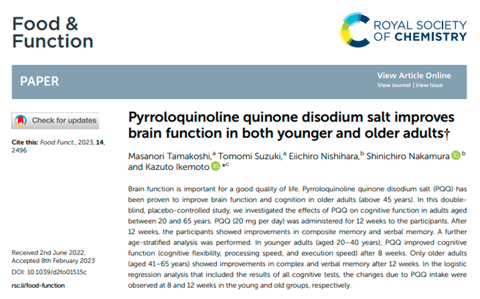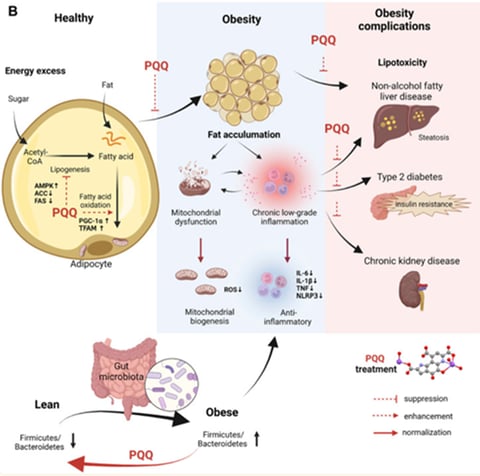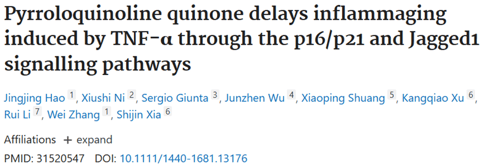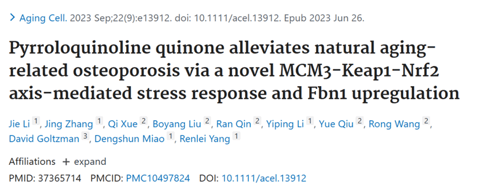Superstar Nutrient: What Does Pyrroloquinoline quinone (PQQ)Do for the Brain
Pyrroloquinoline quinone, referred to as PQQ, is a new prosthetic group that has physiological functions similar to vitamins. It is widely found in prokaryotes, plants and mammals, such as fermented soybeans or natto, green peppers, kiwi fruits, Parsley, tea, papaya, spinach, celery, breast milk, etc.
In recent years, PQQ has become one of the "star" nutrients that have attracted widespread attention. In 2022 and 2023, my country approved PQQ produced by synthesis and fermentation as new food raw materials.
The biological functions of PQQ are mainly concentrated in two aspects. First, it can support the growth and development of mitochondria and stimulate the rapid growth of human cells; second, it has good antioxidant properties, which can help remove free radicals and reduce cell damage.
These two functions make it play a powerful role in brain health, cardiovascular health, metabolic health and other aspects. Because the human body cannot synthesize PQQ on its own, it needs to be supplemented through dietary supplements.
What Does PQQ Do for the Brain
PQQ can not only improve the brain function of the elderly, but also improve the brain response of young people.
In March 2023, the internationally renowned journal Food & Function published a research paper titled "Pyrroloquinoline quinone disodium salt improves brain function in both younger and older adults". This study investigated the impact of PQQ on the cognitive function of adults aged 20-65, expanding the study population of PQQ from the elderly to young people. The study proved that PQQ can improve the cognitive function of people of all ages.

As a functional food, research has found that PQQ can improve brain function at any age, and is expected to expand the use of PQQ as a functional food from the elderly to people of all ages.
What Does PQQ Do For The Heart
Pyrroloquinoline quinone (PQQ) is a compound that has been studied for its potential benefits on heart health. While research is ongoing and more evidence is needed, some studies suggest that PQQ may have several effects that could be beneficial for the heart:
Antioxidant properties: It acts as an antioxidant, helping to neutralize harmful free radicals in the body. Oxidative stress and damage caused by free radicals are implicated in various cardiovascular conditions, including heart disease. By reducing oxidative stress, PQQ may help protect the heart from damage.
Mitochondrial support: PQQ has been shown to support mitochondrial function. Mitochondria are the energy-producing organelles within cells, and they play a crucial role in the health of the heart, which has high energy demands. By supporting mitochondrial function, PQQ may help maintain the energy levels necessary for optimal heart function.
Anti-inflammatory effects: Chronic inflammation is a key contributor to the development and progression of cardiovascular diseases such as atherosclerosis and heart failure. Some research suggests that PQQ may have anti-inflammatory effects, which could help reduce inflammation in the cardiovascular system and protect against heart disease.
Blood pressure regulation: Some studies in animals have suggested that PQQ supplementation may help regulate blood pressure, potentially by improving blood vessel function. High blood pressure is a major risk factor for heart disease, so anything that helps maintain healthy blood pressure levels could benefit heart health.
What Does PQQ Do For The Body
PQQ Can Improve Human Metabolic Function
In May 2023, a review article titled "Pyrroloquinoline-quinone to reduce fat accumulation and ameliorate obesity progression" was published in the journal Front Mol Biosci, which summarized 5 animal studies and 2 cell studies.

The results show that PQQ can reduce body fat, especially visceral and liver fat accumulation, thereby preventing dietary obesity. From a principle analysis, PQQ mainly inhibits lipogenesis and reduces fat accumulation by improving mitochondrial function and promoting lipid metabolism.
PQQ Prevents Osteoporosis Caused By Natural Aging
In September 2023, Aging Cell published a research paper titled "Pyrroloquinoline quinone alleviates natural aging‐related osteoporosis via a novel MCM3‐Keap1‐Nrf2 axis‐mediated stress response and Fbn1 upregulation" online. The study, through experiments on mice, found that dietary PQQ supplements can prevent osteoporosis caused by natural aging. The underlying mechanism of PQQ's powerful antioxidant capacity provides an experimental basis for PQQ's use as a dietary supplement for the prevention of age-related osteoporosis. This study reveals the effective role and new mechanism of PQQ in preventing and treating senile osteoporosis, and proves that PQQ may be used as a safe and effective dietary supplement to prevent and treat senile osteoporosis.
PQQ For Eyes
Supplementing PQQ Protects Retinal Ganglion Cells and Improves Eye Health
In September 2023, the journal Acta Neuropathol Commun published a study from relevant ophthalmology experts and scholars from the Eye Hospital of Karolinska Institutet in Stockholm, Sweden, a famous European medical school, as well as the Royal Victoria Eye and Ear Hospital in Australia, and the Department of Biology of the University of Pisa in Italy. It is titled "Pyrroloquinoline quinone drives ATP synthesis in vitro and in vivo and provides retinal ganglion cell neuroprotection."

Research has proven that PQQ has a protective effect on retinal ganglion cells (RGC) and has great potential as a new neuroprotective agent in resisting retinal ganglion cell apoptosis. The findings support the potential role of PQQ as a novel visual neuroprotective agent that can improve the resilience of retinal ganglion cells while reducing the risk of possible side effects. At the same time, researchers believe that supplementing PQQ is an effective option for maintaining eye health.
PQQ Can Delay Cell Aging And Extend Life
In January 2020, a research paper titled Pyrroloquinoline quinone delays inflammaging induced by TNF-α through the p16/p21 and Jagged1 signaling pathways published in Clin Exp Pharmacol Physiol magazine directly verified the anti-aging effect of PQQ in human cells. The results show that PQQ delays human cell aging and may extend lifespan.

Researchers found that PQQ can delay human cell aging, and further verified this conclusion through the expression results of multiple biomarkers such as p21, p16, and Jagged1. It is suggested that PQQ can improve the overall health of the population and extend life span.
Is PQQ Better Than CoQ10
Pyrroloquinoline quinone (PQQ) and coenzyme Q10 (CoQ10) are both compounds that have been studied for their potential health benefits, particularly in relation to mitochondrial function and antioxidant activity. While both PQQ and CoQ10 play important roles in cellular energy production and antioxidant defense, they have distinct mechanisms of action and may offer complementary benefits rather than being directly comparable.

Here are some key differences between PQQ and CoQ10
Mechanisms of action: PQQ acts as a cofactor for various enzymes involved in cellular energy metabolism, particularly within the mitochondria. It also exhibits antioxidant properties and can help protect cells from oxidative stress. CoQ10, on the other hand, plays a crucial role in the electron transport chain, a series of biochemical reactions that generate adenosine triphosphate (ATP), the primary energy currency of cells. CoQ10 also functions as an antioxidant, helping to neutralize free radicals and protect cells from oxidative damage.
Antioxidant activity: While both PQQ and CoQ10 possess antioxidant properties, they may target different types of free radicals and oxidative stress pathways. Some research suggests that PQQ may have a higher antioxidant capacity compared to CoQ10 in certain contexts, it also has potential benefits for cognitive function and memory. but more studies are needed to directly compare their antioxidant activities.

Bioavailability: CoQ10 is more extensively studied and has been available as a dietary supplement for a longer time than PQQ. CoQ10 supplements are generally well-absorbed by the body, although absorption may vary depending on the formulation and individual factors. PQQ, on the other hand, has been less studied in terms of bioavailability, but some research suggests that it may be absorbed efficiently when taken orally.
Potential synergistic effects: Some researchers believe that PQQ and CoQ10 may work synergistically to support mitochondrial function and overall cellular health. Combining these two compounds in a supplement may offer complementary benefits, although more research is needed to understand the specific interactions between PQQ and CoQ10.
How Much PQQ Should I Take A Day?
The optimal dosage of PQQ (Pyrroloquinoline quinone) can vary depending on factors such as age, health condition, and individual needs. However, typical dosages range from 10 mg to 20 mg per day for general health and antioxidant support. Some individuals may take higher doses for specific health concerns, but it's essential to consult with a healthcare professional before exceeding recommended dosages. They can provide personalized advice based on your health status and any other medications or supplements you may be taking.
Please send inquiry to email: extract@chenlangbio.com if you want to buy pyrroloquinoline quinone powder.


